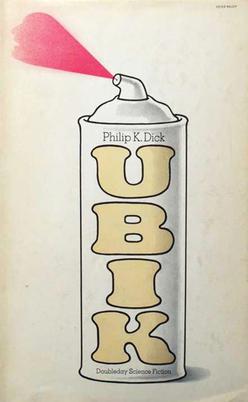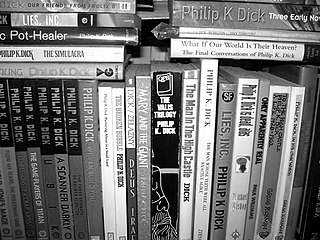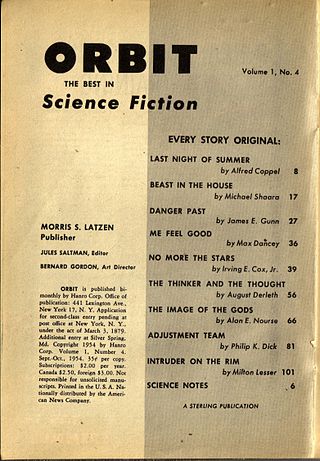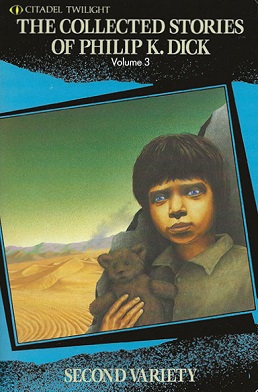
Philip Kindred Dick, often referred to by his initials PKD, was an American science fiction writer and novelist. He wrote 44 novels and about 121 short stories, most of which appeared in science fiction magazines during his lifetime. His fiction explored varied philosophical and social questions such as the nature of reality, perception, human nature, and identity, and commonly featured characters struggling against elements such as alternate realities, illusory environments, monopolistic corporations, drug abuse, authoritarian governments, and altered states of consciousness. He is considered one of the most important figures in 20th-century science fiction.

Ubik is a 1969 science fiction novel by American writer Philip K. Dick. The story is set in a future 1992 where psychic powers are utilized in corporate espionage, while cryonic technology allows recently deceased people to be maintained in a lengthy state of hibernation. It follows Joe Chip, a technician at a psychic agency who begins to experience strange alterations in reality that can be temporarily reversed by a mysterious store-bought substance called Ubik. This work expands upon characters and concepts previously introduced in the vignette "What the Dead Men Say".
"Second Variety" is a science fiction novelette by American writer Philip K. Dick, first published in Space Science Fiction magazine, in May 1953. Set in a world where war between the Soviet Union and United Nations has reduced most of the world to a barren wasteland, the story concerns the discovery, by the few remaining soldiers left, that self-replicating robots originally built to assassinate Soviet agents have gained sentience and are now plotting against both sides. It is one of many stories by Dick examining the implications of nuclear war, particularly after it has destroyed much or all of the planet.

Parker Brothers was an American toy and game manufacturer which in 1991 became a brand of Hasbro. More than 1,800 games were published under the Parker Brothers name since 1883. Among its products were Monopoly, Clue, Sorry!, Risk, Trivial Pursuit, Ouija, Aggravation, Bop It, Scrabble, and Probe. The trade name became defunct with former products being marketed under the "Hasbro Gaming" label, with the logo shown on Monopoly games.
Anti-Monopoly is a board game made by San Francisco State University Professor Ralph Anspach in response to Monopoly. The idea of an anti-monopoly board game dates to 1903 when Lizzie Magie created The Landlord's Game, which later inspired Monopoly.
"Null-O" is a 1958 science fiction short story by American writer Philip K. Dick. It examines the concept of totally unempathic and 'logical' humans ("Null-Os") in a parody of the plot and concepts of The Pawns of Null-A by A. E. van Vogt. These beings view individual collections of matter, i.e. any object, as subjective structures and see the true state of reality as an 'undifferentiated world of pure energy'. They can also move their ears independently, giving them excellent hearing. After attaining positions of power they proceed with a plan to ultimately return everything in the universe to this state. This is to be done by the construction of successively more powerful bombs, ultimately resulting in the rather improbable 'U-bomb' that will homogenise the whole universe. The Null-O plan is halted, however, when the 'ordinary' people of the world, who have survived the nuclear destruction of Earth's surface in the shelters built by their employers, rise up in drilling machines to stop the construction of an 'E-Bomb' designed to destroy Earth, and succeed in destroying both the E-Bomb prototype and the Null-O's themselves.
"Foster, You're Dead!" is a 1955 science fiction short story by American writer Philip K. Dick. It was first published in Star Science Fiction Stories No.3.
"Breakfast at Twilight" is a science fiction short story by American writer Philip K. Dick. It was received by the Scott Meredith Literary Agency on January 17, 1953 and first published in Amazing Stories, July 1954. It appears in the second volume reprint of Philip K. Dick's short stories Second Variety.

Captain Power and the Soldiers of the Future is a science fiction-action television series, merging live action with animation based on computer-generated images, that ran for 22 episodes in Canadian and American syndication. A toy line was also produced by Mattel, and during each episode there was a segment that included visual and audio material which interacted with the toys. A production of Landmark Entertainment Group, Captain Power and the Soldiers of the Future was created by Gary Goddard and Tony Christopher, and developed by Marc Scott Zicree, with J. Michael Straczynski becoming de facto head writer. Plans to bring the series back, set 28 years after the first series, were announced in July 2016. Goddard Film Group, headed by one of the original series co-creators, Gary Goddard, was one of the development teams working on the new series.

The bibliography of Philip K. Dick includes 44 novels, 121 short stories, and 14 short story collections published by American science fiction author Philip K. Dick during his lifetime.

"Adjustment Team" is a science fiction short story by American writer Philip K. Dick. It was first published in Orbit Science Fiction with illustration by Faragasso. It was later reprinted in The Sands of Mars and Other Stories (Australian) in 1958, The Book of Philip K. Dick in 1973, The Turning Wheel and Other Stories in 1977, The Collected Stories of Philip K. Dick in 1987 (Underwood–Miller), 1988, 1990, Selected Stories of Philip K. Dick in 2002 and in The Early Work of Philip K. Dick, Volume One: The Variable Man & Other Stories in 2009.

The board game Monopoly has its origin in the early 20th century. The earliest known version, known as The Landlord's Game, was designed by Elizabeth Magie and first patented in 1904, but existed as early as 1902. Magie, a follower of Henry George, originally intended The Landlord's Game to illustrate the economic consequences of Ricardo's Law of economic rent and the Georgist concepts of economic privilege and land value taxation. A series of board games was developed from 1906 through the 1930s that involved the buying and selling of land and the development of that land. By 1933, a board game already existed much like the modern version of Monopoly that has been sold by Parker Brothers and related companies through the rest of the 20th century, and into the 21st. Several people, mostly in the midwestern United States and near the East Coast of the United States, contributed to its design and evolution.

The Collected Stories of Philip K. Dick is a collection of 118 science fiction stories by American writer Philip K. Dick. It was first published by Underwood-Miller in 1987 as a five volume set. See Philip K. Dick bibliography for information about the mass market reprints.

Second Variety is a collection of science fiction stories by American writer Philip K. Dick. It was first published by Citadel Twilight in 1991 and reprints Volume III of The Collected Stories of Philip K. Dick with the addition of the story "Second Variety". Many of the stories had originally appeared in the magazines If, Science Fiction Adventures, Science Fiction Stories, Orbit, Fantasy and Science Fiction, Imagination, Future, Galaxy Science Fiction, Beyond Fantasy Fiction, Satellite, Science Fiction Quarterly, Imaginative Tales and Space Science Fiction. There is huge overlap with the 1997 The Philip K. Dick Reader: stories 1–20 and 24 are identical.

The Minority Report is a re-titled collection of science fiction stories by Philip K. Dick. It was published by Gollancz and Citadel Twilight in 1991, being a reprint of Volume IV, "The Days of Perky Pat" of The Collected Stories of Philip K. Dick (1987). The collection The Days of Perky Pat was published in Britain in hardback by Gollancz in 1990 and in paperback by Grafton in 1991. The stories had originally appeared in the magazines Galaxy Science Fiction, Science Fiction Stories, If, Fantastic Universe, Fantasy and Science Fiction, Fantastic, Worlds of Tomorrow, Escapade and Amazing Stories.

The Eye of the Sibyl is a collection of science fiction stories by American writer Philip K. Dick. It was first published by Citadel Twilight in 1992 and reprints Volume V of The Collected Stories of Philip K. Dick, omitting the story "We Can Remember It for You Wholesale". Many of the stories had originally appeared in the magazines Worlds of Tomorrow, Galaxy Science Fiction, Amazing Stories, Fantasy and Science Fiction, Famous Science Fiction, Niekas, Rolling Stone College Papers, Interzone, Playboy, Omni and The Yuba City High Times.

The Philip K. Dick Reader is a collection of science fiction stories by American writer Philip K. Dick. It was first published by Citadel Twilight in 1997. Many of the stories had originally appeared in the magazines If, Science Fiction Adventures, Science Fiction Stories, Orbit, Fantasy and Science Fiction, Imagination, Future, Galaxy Science Fiction, Beyond Fantasy Fiction, Satellite, Imaginative Tales, Fantastic Universe and Space Science Fiction. It is identical in content and order to the edition of volume 3 of the Collected Stories of Philip K. Dick produced by the same publisher apart from the substitution of three stories in positions 21-23 of 24 and the omission of the end notes in the Collected Stories edition. At press time, stories 21 and 24 had already been made into successful movie adaptations and stories 22 and 23 had been optioned.
"Fair Game" is a science fiction short story written by Philip K. Dick in 1953 and first published in 1959 in If Magazine. The story was re-published in the third collected volume of Dick's short stories, The Father-thing in 1987.

"The Crystal Crypt" is a science fiction short story by American writer Philip K. Dick, first published in the January 1954 edition of Planet Stories and later published in Beyond Lies the Wub in 1988.












